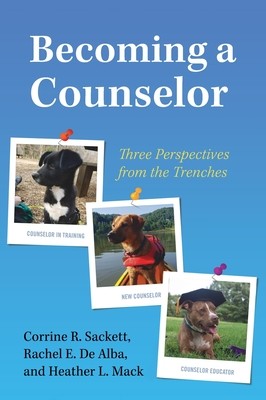
- We will send in 10–14 business days.
- Author: Corrine R Sackett
- Publisher: Cognella Academic Publishing
- ISBN-10: 1793545219
- ISBN-13: 9781793545213
- Format: 17.8 x 25.4 x 1.1 cm, hardcover
- Language: English
- SAVE -10% with code: EXTRA
Reviews
Description
Featuring highly relatable and engaging accounts from a counselor-in-training, a new counselor, and a counselor educator, Becoming a Counselor: Three Perspectives from the Trenches is designed to ignite important reflection and conversation regarding the journey of counselor development. Leveraging their distinct range of experiences, Corrine R. Sackett, Rachel E. De Alba, and Heather L. Mack provide insight into this process.
The text covers an array of issues, including self-care and balance, discussing culture, confronting imposter syndrome, and cultivating skills. Readers are invited to reflect on the process of developing a theoretical orientation, embracing vulnerability and taking risks, managing countertransference, and learning from mistakes. Dedicated chapters speak to supervision, creativity in counseling, connecting with peers, and advocating for clients. Closing chapters underscore the joys of counseling, reveal what the authors wish they'd learned in graduate school, and acknowledge the challenge of becoming a counselor during a pandemic. Questions throughout the text are intended to elicit reflection and conversation around the reader's experience of each topic.
EXTRA 10 % discount with code: EXTRA
The promotion ends in 18d.08:34:38
The discount code is valid when purchasing from 10 €. Discounts do not stack.
- Author: Corrine R Sackett
- Publisher: Cognella Academic Publishing
- ISBN-10: 1793545219
- ISBN-13: 9781793545213
- Format: 17.8 x 25.4 x 1.1 cm, hardcover
- Language: English English
Featuring highly relatable and engaging accounts from a counselor-in-training, a new counselor, and a counselor educator, Becoming a Counselor: Three Perspectives from the Trenches is designed to ignite important reflection and conversation regarding the journey of counselor development. Leveraging their distinct range of experiences, Corrine R. Sackett, Rachel E. De Alba, and Heather L. Mack provide insight into this process.
The text covers an array of issues, including self-care and balance, discussing culture, confronting imposter syndrome, and cultivating skills. Readers are invited to reflect on the process of developing a theoretical orientation, embracing vulnerability and taking risks, managing countertransference, and learning from mistakes. Dedicated chapters speak to supervision, creativity in counseling, connecting with peers, and advocating for clients. Closing chapters underscore the joys of counseling, reveal what the authors wish they'd learned in graduate school, and acknowledge the challenge of becoming a counselor during a pandemic. Questions throughout the text are intended to elicit reflection and conversation around the reader's experience of each topic.


Reviews